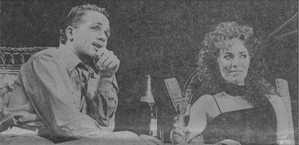Lloyd Webber
Aspects of Love
Phantom of the Opera
Starlight Express
Cats
Les Miserables
Miss Saigon
Metropolis
The Baker's Wife
Time
Stars of the Stage
How to wrap an opera in musical wallpaper
Andrew Lloyd Webber gets some sound advice from John Peter
Andrew Lloyd Webber is at a crossroads. The question is this: is the foremost British composer of musicals going to continue with undemanding spectaculars, or is he about to strike out in a new direction?
The question is important because Lloyd Webber works on that difficult borderline where art and entertainment criss-cross into each other's territories, raising such questions as: Can entertainment also be art? Is art worth the name if it doesn't entertain? Do the two words mean the same thing to everyone? In any case, the whole idea that they are different is relatively new. It would have sounded incomprehensible to Shakespeare, and a bit puzzling even to Dickens. The Greeks, whom it is always useful to mention when you want to raise the tone of the discussion, used the same word techné, to mean art and craft as well as skill.
But today we do distinguish, even though the borderline is fuzzy. The point about someone like Lloyd Webber is that, like Gershwin or Bernstein, he could tip the scales either way: make the serious-minded more appreciative of good popular music, or open up the world of serious music to people who think it's beyond them. Indeed Trevor Nunn, one of the finest living directors of Shakespeare, has directed bad musicals (Chess), good musicals (Cats, Les Miserables) as well as one of Mozart's less popular operas, all of them superbly.
His problem in directing Aspects of Love (Prince of Wales) is that it is two works in one. On the outside there is a lush, old-fashioned, big-time musical, over-orchestrated but bland, studded with exquisite touches of vulgarity, and short on music, especially good music. Inside, struggling to get out, is a subtle, small-scale popular opera, elegantly conceived, deftly executed, beguiling, civilised and tender. In other words, we may be witnessing the brassy, reach-me-down successor to the best of Sondheim.
As the first act gets underway, things look increasingly dire. The singing is just passable, but you soon notice that nobody is too happy in the upper register. The opening number, Love Changes Everything, is rememberable but not memorable. The words (lyrics by Don Black and Charles Hart) are reassuringly trite. The tune keeps coming back like a Leitmotif in an opera, except that in opera it takes on a different significance each time, as it illuminates a new situation and blends and interlocks with other motifs. Here it keeps blaring and tinkling, as if to remind you that it's still there, like a boring but tenacious party guest who hasn't had enough time to talk to you.
As far as I could tell, there are only two other "tunes" or "numbers" in the whole show: either I'm deaf or Lloyd Webber has submerged his talent in a uniform welter of orchestrated dialogue. Perhaps he's weary of the vulgarities of bug numbers and wants to bind the work together, aided by Leitmotifs, into a dramatic-musical tapestry; but what we actually get is dramatic-musical wallpaper.
David Garnett's novel is a curious choice: a well-told, snobbish and deliciously pretentious little story by a minor Bloomsbury writer which comes across like a well-bred elderly Englishman trying to be Françoise Sagan. The odd thing, given that the whole story is about intricate sexual relationships, is how unerotic the book is. Lloyd Webber's version is the same: the music suggests no sexuality or even deep emotion. Indeed, you realise that Lloyd Webber's musicals have virtually no sensual feeling, and that this may be part of their bland success.
No, all the emotion and the eroticism comes from Nunn's direction of the actors, which, to change the metaphor slightly, is like someone singing one of Mozart's most heart-rending arias to the accompaniment of an old-fashioned electric cinema organ. Things are not helped by the fact that even the most banal sentences, such as someone ordering a coffee, are solemnly set to music. Some of the "sexual" dialogue is quite unforgettably crass, especially the heroine comparing her older lover with his young predecessor, singing, "And he takes his time, unlike you".
Throughout all this, the individual performances shine out with a subtle glitter. Nunn directs his actors with the utmost sophistication. This is still rare in musicals; and if Nunn has helped to enlarge their dramatic scope, then he has also helped art to contribute to entertainment, and his years away from the classics have not been entirely in vain.
Ann Crumb and Michael Ball portray a difficult, intricate relationship with a refinement which is far richer than most of the music; and Ball signals the approach of maturity and early middle age with great skill, unshowy but brilliantly telling. I like Kathleen Rowe McAllen's raunchy Giulietta, even though she seems not to age a day in 19 years, and in one scene she wears a silk jumpsuit which no couturier had yet thought of. Perhaps the finest performance comes from Kevin Colson as the sophisticated middle-aged lover turned jealous father. Lloyd Webber and Nunn showed real artistic courage, also rare in musicals, in letting the understudy take over from Roger Moore, and Colson repays their faith with acting of high polish, elegance and sophisticated humour.
Maria Björnson's sets, too, signal to us that something other than blockbusting is going on: their economy and simplicity are a long way from the machine-dominated stridency of the fashionable mega-musical - though I must say my heart sank when a telegram floated down from somewhere like an out-of-work fig leaf. Couldn't the budget have run to a postman?
The most interesting things happen in Act Two. The song The Very First Man You Remember floated across with subtle, aching melancholy: the spare, limpid orchestration and the beautifully organised ensemble acting blended into a long passage of touching feeling, underscored with a sense of fugitive sensuality. As with some of Sondheim's songs, the point is not whether it's a tune you can hum on the way home, but whether the music is in tune with the feeling of the moment. I don't think you have to be steeped in classical opera to respond to this; and if this is the new direction of Lloyd Webber's work then we have a lot to look forward to.

Launching an intricate relationship:
Michael Ball and Ann Crumb in
Andrew Lloyd Webber's Aspects of Love (Alastair Muir)
John Peter, The Sunday Times, 23 April 1989

